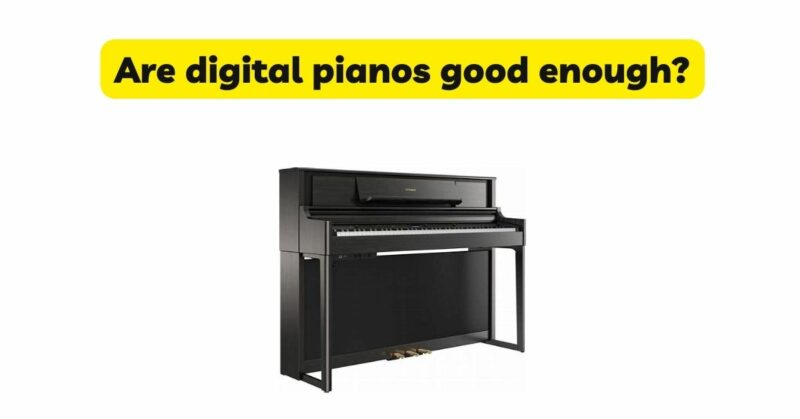The world of music has seen a significant shift in recent decades with the rise of digital pianos. Once considered mere substitutes for acoustic pianos, digital pianos have evolved tremendously, both in terms of sound quality and technological advancements. In this article, we will explore the question: Are digital pianos good enough? We will delve into the various aspects of digital piano technology and highlight the benefits they offer to musicians and enthusiasts alike.
- Sound Quality: One of the primary concerns when comparing digital pianos to acoustic pianos is sound quality. While it is true that nothing can fully replicate the depth and resonance of a well-maintained acoustic piano, digital pianos have made significant strides in this area. Through sophisticated sampling techniques, digital pianos capture the sound of acoustic pianos meticulously. High-end models utilize multi-sample recordings of each piano key, resulting in rich and authentic piano tones. Many digital pianos also offer various piano voices, including concert grands and uprights, allowing musicians to explore a wide range of sounds beyond traditional pianos.
- Touch and Feel: The touch and feel of a piano’s keys are crucial in delivering an expressive and immersive playing experience. Initially, digital pianos fell short in replicating the touch of acoustic pianos. However, with advancements in key action technology, many digital pianos now offer a remarkably realistic playing experience. Weighted keys with graded hammer action simulate the feel of an acoustic piano, where the lower keys are heavier and the higher keys are lighter. Some models even incorporate escapement mechanisms that mimic the “let-off” feeling when keys are released, further enhancing the authenticity of the playing experience.
- Portability and Space Considerations: One of the significant advantages digital pianos hold over acoustic pianos is their portability and space-saving nature. Acoustic pianos are large and heavy instruments that require a dedicated space in the home. In contrast, digital pianos are compact and lightweight, making them easily movable. This portability allows musicians to take their instrument to gigs, studios, or practice sessions without the logistical challenges associated with transporting an acoustic piano. Digital pianos are also ideal for those living in small apartments or shared spaces, where space constraints would make owning an acoustic piano impractical.
- Maintenance and Durability: Acoustic pianos demand regular maintenance, including tuning, voicing, and temperature/humidity control. This maintenance can be both time-consuming and costly. Digital pianos, on the other hand, require minimal maintenance. They are not affected by environmental factors such as humidity, eliminating the need for regular tuning. Furthermore, digital pianos do not have strings, hammers, or other mechanical components that are susceptible to wear and tear, resulting in greater durability and longevity.
- Additional Features and Flexibility: Digital pianos offer a wide range of additional features that enhance the playing experience and provide greater flexibility. Many models include built-in metronomes, recording capabilities, and a variety of instrument voices beyond pianos. They may also offer connectivity options such as MIDI, USB, and Bluetooth, allowing musicians to connect to computers, recording equipment, or music software for composition and performance purposes. Additionally, digital pianos often incorporate headphone jacks, enabling private practice without disturbing others, and some models have integrated speakers, eliminating the need for external amplification.
Conclusion: In answering the question, “Are digital pianos good enough?” it becomes evident that digital pianos have come a long way and now offer a viable alternative to acoustic pianos. While nothing can replace the charm and acoustic authenticity of a grand or upright piano, digital pianos excel in various aspects, including sound quality, touch and feel, portability, low maintenance, and additional features. For aspiring pianists, professionals, or enthusiasts with limited space, budget, or specific musical requirements, digital pianos provide a remarkable opportunity to experience the joy of playing the piano without compromising on quality or performance. Ultimately, the choice between a digital piano and an acoustic piano will depend on individual preferences, needs, and circumstances.


